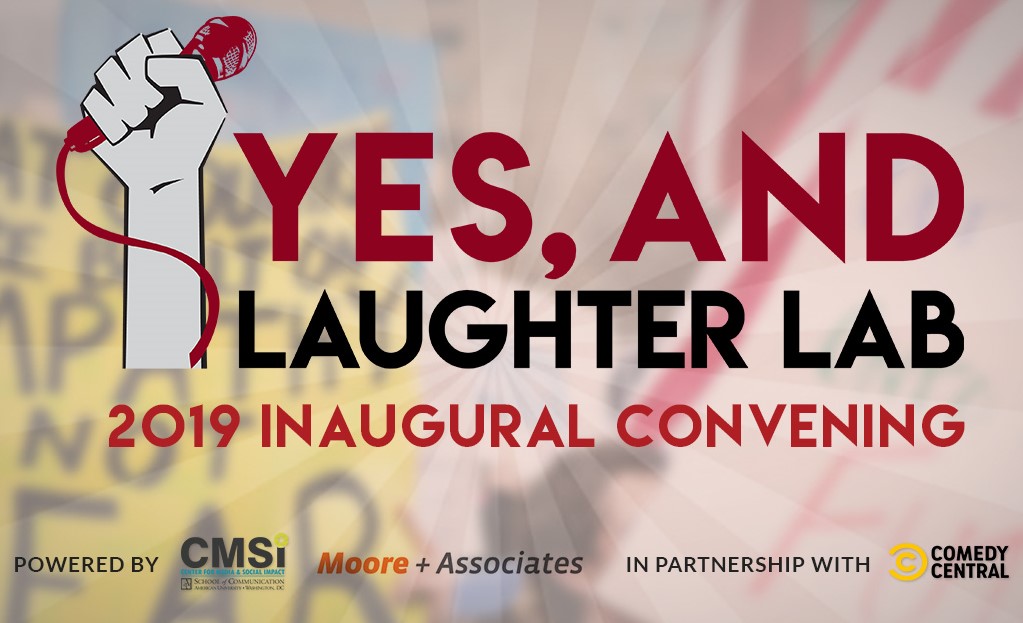
Comedians and social justice professionals share a common goal — seeking out hard truths and making them easier to hear. And yet, these two sectors are virtually disconnected, with very little cross-talk and collaboration. In early summer, a group of comedians, media executives, social justice workers, and philanthropists got together in a New York alt-comedy club for the day-long inaugural convening of Yes, And … Laughter Lab, in an attempt to create a new pipeline of collaboration between comedy, entertainment, and social justice.
Co-founded by the Center for Media & Social Impact (CMSI) and Moore + Associates and in partnership with Comedy Central, Yes And… Laughter Lab seeks to pair comedians with people in social justice sectors to streamline the production and distribution of social issue-oriented comedy projects. The purpose is twofold: to bring the organization power of social justice activism to comedy, and the persuasive power of comedy to social justice activism. Out of nearly 500 applications, six outstanding teams of comedians were selected to pitch their ideas to people from the social justice, philanthropy and entertainment sectors. Think Shark Tank, if the Sharks were not sharky, the Tank was a comedy club, and the entrepreneurs were comedians.
Power of comedy
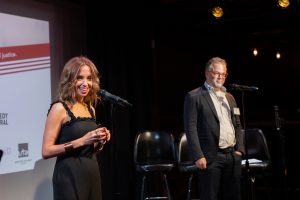 “It is our love child,” teased Caty Borum Chattoo, Director of CMSI, as she kicked off the day with fellow co-founder Mik Moore from Moore + Associates as they introduced the purpose of the event: to put comic artists at the center of social justice work, and give concrete support to comedians to carry out their production.
“It is our love child,” teased Caty Borum Chattoo, Director of CMSI, as she kicked off the day with fellow co-founder Mik Moore from Moore + Associates as they introduced the purpose of the event: to put comic artists at the center of social justice work, and give concrete support to comedians to carry out their production.
In Moore’s experience, comedians want their work to have a social impact, but nonprofit organizations rarely collaborate with comedians on communication strategies, beyond hiring them as hosts for one-night benefits. Borum Chattoo believes that comedy is underused as a persuasive tool, especially by the nonprofits that rely on anger-based strategies to motivate people. “Social justice and comedy are deviant cousins,” she said, pointing out the social impact of comedic works like Last Week Tonight with John Oliver, Modern Family, and her own documentary, Stand-up Planet, which features Hasan Minhaj. Borum Chattoo explained that the human brain processes humorous information differently, and as a result, comedy can help disarm an audience’s defensiveness about new ideas that might challenge their previous beliefs. “Comedy has a sleeper effect,” she said, elaborating on how comedy can plant a seed which will continue to grow and occupy space in the audience’s minds well after the performance is over.
CMSI and Moore + Associates put together a selection committee consisting of some of the most high-profile comedians: Abbi Jacobson and Ilana Glazer from Comedy Central’s Broad City, Aasif Mandvi and Roy Wood Jr. from Comedy Central’s The Daily Show, and standup comedian Sabrina Jalees. The committee also featured many brilliant off-stage minds like Jennie Church-Cooper, a producer at Netflix’s Patriot Act with Hasan Minhaj, and Jeffrey P. Jones, the Director of the Peabody Awards.
The committee sifted through 500 submissions to look for promising projects which envisioned comedy that would foster public engagement with social issues in an entertaining way. “We do not want comedy that is too message-y,” asserted Borum Chattoo, elaborating on why it was important to not lose sight of entertainment in creating communication projects that can foster public engagement. The list of applicants was boiled down to 40 finalists, out of which six outstanding projects were invited to pitch their ideas at the inaugural event.
Social change through comedy
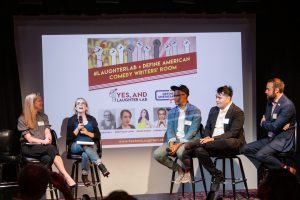 The Laughter Lab started off with two engaging and thought-provoking panel discussions that set the tone for the rest of the day by establishing the shared goals of the congregation — bringing the power of comedy to social justice. Bethany Hall, comedian in-residence at American University, kicked off the first panel entitled “Can Comedy Help Define American?” which featured José Antonio Vargas, Elizabeth Vorhees and Ryan Eller from the non-profit Define American, and comedian and writer Jordan Carlos. The panel discussed three project ideas that had been developed with Define American in a “100% collaborative” writers’ room featuring writers and comedians like Hall, Erin Foley Chan, Grace Parra, Jordan Carlos, and Moujan Zolfaghari. These projects aimed to broaden the definition of the American experience by representing the voices and stories that are often left untold. Project ideas were formed with the vision of “reaching out to the purples” in other words, people who live in areas with a mix of political ideologies and do not swing heavily to either side of the political spectrum. “We don’t just want to make people laugh,” said Vargas, “but also to correct biases and liberate people.”
The Laughter Lab started off with two engaging and thought-provoking panel discussions that set the tone for the rest of the day by establishing the shared goals of the congregation — bringing the power of comedy to social justice. Bethany Hall, comedian in-residence at American University, kicked off the first panel entitled “Can Comedy Help Define American?” which featured José Antonio Vargas, Elizabeth Vorhees and Ryan Eller from the non-profit Define American, and comedian and writer Jordan Carlos. The panel discussed three project ideas that had been developed with Define American in a “100% collaborative” writers’ room featuring writers and comedians like Hall, Erin Foley Chan, Grace Parra, Jordan Carlos, and Moujan Zolfaghari. These projects aimed to broaden the definition of the American experience by representing the voices and stories that are often left untold. Project ideas were formed with the vision of “reaching out to the purples” in other words, people who live in areas with a mix of political ideologies and do not swing heavily to either side of the political spectrum. “We don’t just want to make people laugh,” said Vargas, “but also to correct biases and liberate people.”
The second panel was entitled “Comedy for Social Change: The Good. The Bad. The Funny” co-hosted by Borum Chattoo and Moore, and featured Rise founder Amanda Nguyen, Erika Soto Lamb from Comedy Central, Kashif Shaikh from Pillars Fund, and comedian and senior fellow at Pop Culture Collaborative, Zahra Noorbakhsh. Together, they fit the bill for Yes, And … Laughter Lab perfectly — starring representatives from each of the fields of entertainment, comedy, and social justice, all sharing Borum Chattoo and Moore’s vision for comedy as a tool for social justice.
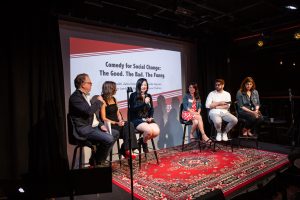
However, there have been obstacles in previous attempts at collaborations between social justice workers and comedians. Shaikh acknowledged that, “social justice workers do not always have a great sense of humor,” recalling his experience with disagreements between comedians and social justice workers on what is and isn’t funny. At the Pillars fund, Shaikh has worked with comedians to develop programming, like Halal In The Family, that can change the way people view Muslims in the United States. “Representation in pop culture does not happen overnight,” said Shaikh as he emphasized the importance of leveraging pop culture to tell underrepresented stories, “this work takes a long time; it is generational.” Noorbakhsh, who calls herself a “Muslim, feminist, Iranian-American comedian” agreed with Shaikh’s point, tying it with her own struggle in creating her stand-up act. The audience has had certain expectations around being a Muslim woman, and Noorbakhsh has weaponized her comedic voice to break these expectations and reform narratives around Muslim identity. She attributes her comedic courage to Taz Ahmed, her co-host on #GoodMuslimBadMuslim podcast, and W. Kamau Bell, whose Solo Performance Workshop she took in 2007. In the workshop, Bell asked her to list the ten things she was most afraid to say — number three for her was “I am not Muslim.” Since then Noorbakhsh has used stand-up comedy to re-center narratives around her Muslim identity. “My narrative was up to me,” she said, “and not up to the liberal white audience.”
Comedians, like most other creative professionals, often find themselves at crossroads with researchers and content producers who want tight control over the creative product. “Comedy is an art form,” said Borum Chattoo, “and art cannot be measured.” The panelists agreed that letting comedians freely express their stories and exercise their full creative potential is crucial to creating entertainment programs which foster conversations around social justice. In Borum Chattoo’s words, “Comedy is great when it is deviant, funny and creatively free.”
Comedy pitches
After a quick lunch break, the event progressed to the much-anticipated pitch presentations, emceed by Zahra Noorbakhsh, who kicked off the session with an energetic stand-up act, working as a shot of caffeine for a post-lunch-slump audience. The pitch session featured six carefully selected comedy projects which promised great entertainment while inspiring conversations around pressing social issues. A pitch table was set in front of the stage and quickly occupied by interested representatives and executives from philanthropies, nonprofits, and entertainment companies. The “suits” on the pitch table represented establishments such as Above Average, ACLU, Bossy Boots, TruTV, Define American, Bossy Boots, Center for Popular Democracy, Harness, MTV, Metallic Entertainment, Running Man, Illuminative, Tumblr, Color of Change, Move On, Irony Point, Refinery29, DoSomething.org, Caring Across Generations, Levity Entertainment Group, Metallic Entertainment, and Vital Strategies.
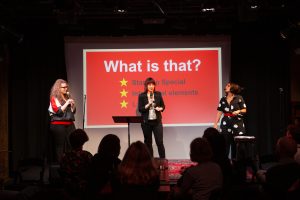 The first project in the lineup was Average Women with Average Rage, a stand-up show in which Leah Bonnema, Negin Farsad, and Ophira Eisenberg bring their different ethnic and cultural experiences to the stage. “I am an Iranian, Muslim, American female, like you all of you,” said Farsad to room in splits. “I was on MSNBC once,” she continued, “and someone commented online, calling me a nerdy Jew, which was really an upgrade.” “Hey! I am the nerdy Jew!” intercepted Eisenberg. The proposed 90-minute standup act promises some great laughs, while also talking about women’s issues and its interstitial elements, from reproductive rights to racial discrimination. The proposed stand up show will be free of cost in an inclusive attempt to reduce the barrier-to-entry. Additionally, the comedians proposed touring their show in states where women and race-related issues are the most pertinent — “places where they love the Mussies,” as Farsad sarcastically calls them. The show is meant to invite people with different views to look at these issues through a new lens, instead of ostracizing them and blaming them for their pre-existing beliefs.
The first project in the lineup was Average Women with Average Rage, a stand-up show in which Leah Bonnema, Negin Farsad, and Ophira Eisenberg bring their different ethnic and cultural experiences to the stage. “I am an Iranian, Muslim, American female, like you all of you,” said Farsad to room in splits. “I was on MSNBC once,” she continued, “and someone commented online, calling me a nerdy Jew, which was really an upgrade.” “Hey! I am the nerdy Jew!” intercepted Eisenberg. The proposed 90-minute standup act promises some great laughs, while also talking about women’s issues and its interstitial elements, from reproductive rights to racial discrimination. The proposed stand up show will be free of cost in an inclusive attempt to reduce the barrier-to-entry. Additionally, the comedians proposed touring their show in states where women and race-related issues are the most pertinent — “places where they love the Mussies,” as Farsad sarcastically calls them. The show is meant to invite people with different views to look at these issues through a new lens, instead of ostracizing them and blaming them for their pre-existing beliefs.
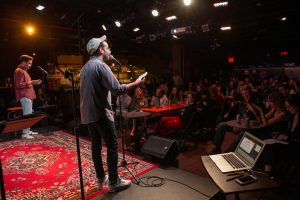 The next pitch was for a half-hour narrative comedy series called Los Blancos by brothers Gabe and Marcos Gonzalez. The series follows the story of the Blancos, one of the richest and whitest Latino families in Miami. Identifying as white Latinos themselves, the Gonzales brothers have fed the show with their personal experiences of having their ethnicities go unrecognized. As Gabe Gonzales put it, “We are the LaCroix of Puerto Ricans: there is a little bit of a flavor there, but we have to tell you first.” Here’s the premise: — the Blancos turn to politics to save their social status after their business begins to falter, and the show follows the development of the political campaign and the characters around it. In a hilarious blend of slide show presentation and stand-up, the Gonzalez brothers laid out the plan for different episodes and story arcs for subsequent seasons. The show promises a diverse team of non-white, Latinx, and LGBTQ writers, essential for a show which would represent Latinx identity and experience.
The next pitch was for a half-hour narrative comedy series called Los Blancos by brothers Gabe and Marcos Gonzalez. The series follows the story of the Blancos, one of the richest and whitest Latino families in Miami. Identifying as white Latinos themselves, the Gonzales brothers have fed the show with their personal experiences of having their ethnicities go unrecognized. As Gabe Gonzales put it, “We are the LaCroix of Puerto Ricans: there is a little bit of a flavor there, but we have to tell you first.” Here’s the premise: — the Blancos turn to politics to save their social status after their business begins to falter, and the show follows the development of the political campaign and the characters around it. In a hilarious blend of slide show presentation and stand-up, the Gonzalez brothers laid out the plan for different episodes and story arcs for subsequent seasons. The show promises a diverse team of non-white, Latinx, and LGBTQ writers, essential for a show which would represent Latinx identity and experience.
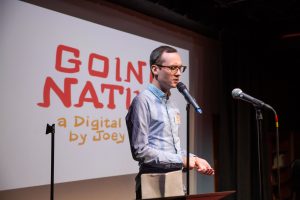 The third presentation was by comedian and animator Joey Clift, who pitched the idea for series of digital animated shorts called Going Native which would shine a light on some of the microaggressions that people make towards Native Americans. In the pilot short, he satirically compared the notion of being “1/16th Native American” with being “1/16th grizzly bear” — “if you tell a grizzly bear that you are 1/16th grizzly bear, chances are you are going to be eaten.” Being a Native American himself, Joey Clift attributes such ignorant behavior to a lack of adequate representation in popular media, which is especially salient when one considers that Native Americans constitute a similar proportion of the population as the Jewish-American and Chinese American communities. The animated short was equal parts hilarious, educational, and adorable, or as Leah Bonnema put it, “gave my heart the feelies.”
The third presentation was by comedian and animator Joey Clift, who pitched the idea for series of digital animated shorts called Going Native which would shine a light on some of the microaggressions that people make towards Native Americans. In the pilot short, he satirically compared the notion of being “1/16th Native American” with being “1/16th grizzly bear” — “if you tell a grizzly bear that you are 1/16th grizzly bear, chances are you are going to be eaten.” Being a Native American himself, Joey Clift attributes such ignorant behavior to a lack of adequate representation in popular media, which is especially salient when one considers that Native Americans constitute a similar proportion of the population as the Jewish-American and Chinese American communities. The animated short was equal parts hilarious, educational, and adorable, or as Leah Bonnema put it, “gave my heart the feelies.”
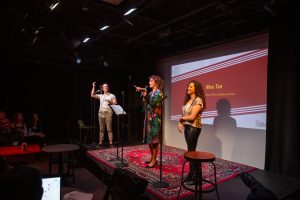 Next up was Nice Tan a sketch comedy show by the hilarious Carla Lee, who pitched alongside her director, Adrian Elliot, and producer, Melissa Daniels. Set in the Bay area the show humorously challenges the idea of being “woke” and satirizes the culture around it. The sketches would show different elements of life and identity in a world that is more ignorant than it thinks it is, with special focus on showcasing experiences of underrepresented communities in an irreverent, satirical manner. The Nice Tan team boasts of a diverse creative team with a majority of women of color and queer persons of color, having already produced some sketches, some of which can be seen on Vimeo. A trailer reel from some of the sketches were shown at their pitch, eliciting unanimous guffaws from the entire room. An experienced executive at the pitch table recognized such a visceral reaction as a premonition for successful television programming that is highly likely to be greenlit by the suits.
Next up was Nice Tan a sketch comedy show by the hilarious Carla Lee, who pitched alongside her director, Adrian Elliot, and producer, Melissa Daniels. Set in the Bay area the show humorously challenges the idea of being “woke” and satirizes the culture around it. The sketches would show different elements of life and identity in a world that is more ignorant than it thinks it is, with special focus on showcasing experiences of underrepresented communities in an irreverent, satirical manner. The Nice Tan team boasts of a diverse creative team with a majority of women of color and queer persons of color, having already produced some sketches, some of which can be seen on Vimeo. A trailer reel from some of the sketches were shown at their pitch, eliciting unanimous guffaws from the entire room. An experienced executive at the pitch table recognized such a visceral reaction as a premonition for successful television programming that is highly likely to be greenlit by the suits.
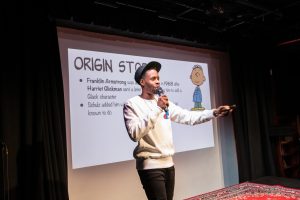 The fifth presentation was by comedian and DJ Mamoudou N’Diaye, who pitched the idea of Franklin, a spinoff show based on the character from the Peanuts cartoon and comic strip series. Franklin is the only black character in the whole Peanuts universe, over the entirety of its run between 1950 and 2000, exemplified by an image from the cartoon that went viral a few years ago. The show takes us years into Franklin’s future after he has grown up away from the Peanuts gang and has become much more aware of his racial identity. He now returns to his hometown, where he was the only black kid, “with axes to grind and hatchets to bury” with the rest of the Peanuts gang. N’Diaye relates to Franklin’s experience because he too was one of the very few black kids in town growing up in a small town. “I realized that I am Franklin!” he said. While the show is inspired by the Peanuts universe, N’Diaye is open to creating a Peanuts-like universe, the same way the creators of Rick and Morty made a Back To The Future-like universe. The show is not limited to representing black identity within the context of a beloved cartoon which lacked representation — N’Diaye wants to include other underrepresented American communities by introducing new characters in the show. “I’m not trying to take a White story and make it a Black story,” he said, “I’m taking an American story and making it all-American.”
The fifth presentation was by comedian and DJ Mamoudou N’Diaye, who pitched the idea of Franklin, a spinoff show based on the character from the Peanuts cartoon and comic strip series. Franklin is the only black character in the whole Peanuts universe, over the entirety of its run between 1950 and 2000, exemplified by an image from the cartoon that went viral a few years ago. The show takes us years into Franklin’s future after he has grown up away from the Peanuts gang and has become much more aware of his racial identity. He now returns to his hometown, where he was the only black kid, “with axes to grind and hatchets to bury” with the rest of the Peanuts gang. N’Diaye relates to Franklin’s experience because he too was one of the very few black kids in town growing up in a small town. “I realized that I am Franklin!” he said. While the show is inspired by the Peanuts universe, N’Diaye is open to creating a Peanuts-like universe, the same way the creators of Rick and Morty made a Back To The Future-like universe. The show is not limited to representing black identity within the context of a beloved cartoon which lacked representation — N’Diaye wants to include other underrepresented American communities by introducing new characters in the show. “I’m not trying to take a White story and make it a Black story,” he said, “I’m taking an American story and making it all-American.”
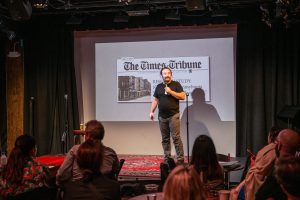 In the final pitch, Murf Meyer presented the idea for a stand-up show called Murf Meyer is Self-Medicated where he would talk through his experience with heroin addiction and share “some of his most amusing, drug-fueled lowlights” in his journey out of that addiction. Meyer grew up in northeastern Pennsylvania, which is one of the areas most affected by the opioid epidemic. He comes from a big family and has lost several loved ones to heroin addiction. Yet, his optimism was breathtaking — “I’m a syringe half-full kinda guy,” he quipped, to a room struggling to catch their breath through their laughter, as they were hit simultaneously by the gravity of the situation and the release provided by the joke. For me, that one moment captured the essence of the Yes, And … Laughter Lab — inviting the public into a discourse about difficult issues by coating them with comedy and letting the comedians take center stage. Murf is currently at the UCB theater in New York City, workshopping his stand-up show, which he plans to perform on tour at drug-rehabilitation centers.
In the final pitch, Murf Meyer presented the idea for a stand-up show called Murf Meyer is Self-Medicated where he would talk through his experience with heroin addiction and share “some of his most amusing, drug-fueled lowlights” in his journey out of that addiction. Meyer grew up in northeastern Pennsylvania, which is one of the areas most affected by the opioid epidemic. He comes from a big family and has lost several loved ones to heroin addiction. Yet, his optimism was breathtaking — “I’m a syringe half-full kinda guy,” he quipped, to a room struggling to catch their breath through their laughter, as they were hit simultaneously by the gravity of the situation and the release provided by the joke. For me, that one moment captured the essence of the Yes, And … Laughter Lab — inviting the public into a discourse about difficult issues by coating them with comedy and letting the comedians take center stage. Murf is currently at the UCB theater in New York City, workshopping his stand-up show, which he plans to perform on tour at drug-rehabilitation centers.
Neuroscience of comedy and social change
The comedy pitches at once assured me of their social impact instinctively, and also perplexed me about the mechanism of such an impact. I wondered and I worried – are we overestimating the power of comedy? What is it about laughing that can change one’s perspectives on social issues? Philosophers, psychologists and neuroscientists who have spent their careers exploring the minutiae of humor broadly believe that humor has its characteristic effect because it either makes you feel superior, releases tension, or resolves a fabricated incongruity. While the superiority theory explains some of the derogatory and bigoted humor, the tension and incongruity theories might explain why, at an individual level, would socially conscious comedy projects be helpful.
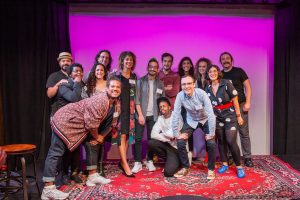 Information in our daily lives are not always consistent or congruous, and we struggle to make sense of it each day. Incongruous information are cognitive puzzles which are inherently unrewarding, and as humans we strive to resolve such incongruities. The most pressing social issues of our times are no different – either not enough information is out there about the issues, or the information is inconsistent and difficult to reconcile. The incongruities do not always present themselves in ways that can be resolved easily. It is the job of the comedian to rinse and filter the information in a way such that the incongruities are crystal clear, and resolving them is easier, and hence more rewarding. The laughter effect, after all, comes from the resolution of incongruities presented in a joke, and the release that accompanies it. When a social issue is sugar-coated with a joke, the comedian is cleverly placing facts in such a way that understanding the joke inevitably leads to understanding the injustices in our society.
Information in our daily lives are not always consistent or congruous, and we struggle to make sense of it each day. Incongruous information are cognitive puzzles which are inherently unrewarding, and as humans we strive to resolve such incongruities. The most pressing social issues of our times are no different – either not enough information is out there about the issues, or the information is inconsistent and difficult to reconcile. The incongruities do not always present themselves in ways that can be resolved easily. It is the job of the comedian to rinse and filter the information in a way such that the incongruities are crystal clear, and resolving them is easier, and hence more rewarding. The laughter effect, after all, comes from the resolution of incongruities presented in a joke, and the release that accompanies it. When a social issue is sugar-coated with a joke, the comedian is cleverly placing facts in such a way that understanding the joke inevitably leads to understanding the injustices in our society.
Neuroscientists have tested neural activity in response to understanding jokes and have consistently found that understanding jokes increases activity in dopaminergic regions, which are associated with reward and pleasure. Such activity is particularly enhanced for jokes which present resolvable incongruities. The more cognitive processing the joke requires, the more pleasurable is the resolution of the joke, leading to more laughter, more attention to the information, and better awareness of social issues. By engaging brain activity associated with memory and attention, jokes can act as education tools above and beyond their entertainment value.
Fixing a broken pipeline
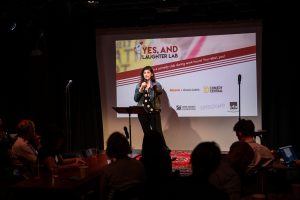 “We are brought together by purpose,” said Noorbakhsh, in closing the event, “not by chance. Today, we fixed a broken pipeline of comedy production.” The event couldn’t have been summarized more accurately. The suits at the pitch table, which featured heavy hitters from the entertainment and social justice sectors, were not there to find mistakes and flaws in the pitches. Instead, they appended each idea with their experience and expertise with the social issues pertinent to the proposed comedy projects. It was a beautiful phenomenon to witness – each production idea was morphed into a proposal for a fleshed-out communication campaign centered around specific social issues. The Laughter Lab contrasted from other “collaborative” initiatives where every “yes, and” is just a coded way to say “yes, but” to new ideas — faithful to the name of the event, every pitch at the Laughter Lab was welcomed with a sincere “yes, and.”
“We are brought together by purpose,” said Noorbakhsh, in closing the event, “not by chance. Today, we fixed a broken pipeline of comedy production.” The event couldn’t have been summarized more accurately. The suits at the pitch table, which featured heavy hitters from the entertainment and social justice sectors, were not there to find mistakes and flaws in the pitches. Instead, they appended each idea with their experience and expertise with the social issues pertinent to the proposed comedy projects. It was a beautiful phenomenon to witness – each production idea was morphed into a proposal for a fleshed-out communication campaign centered around specific social issues. The Laughter Lab contrasted from other “collaborative” initiatives where every “yes, and” is just a coded way to say “yes, but” to new ideas — faithful to the name of the event, every pitch at the Laughter Lab was welcomed with a sincere “yes, and.”
What was also starkly visible was the difference in racial diversity on the pitch table versus the stage. While the comedians represented different underrepresented groups, such diversity was absent at the pitch table. Maybe that is what an event like this exists to change — to slowly expand access to the means of production to underrepresented communities.
In my work as a communication and social neuroscience doctoral student, I study different theories and strategies of humor-based communication and test the effect of such strategies on brain activity. By focusing on audience-facing problems, I had never considered the communication challenges that might exist within the industry of communication, and how that can impact the quality of the resultant communication strategies. Yes, And … Laughter Lab is an attempt to solve this communication problem, and it was hard not to take a step back throughout the inaugural event to let the significance of the event sink in. A culmination of years of strategizing and mobilizing of comedians, social justice activists, and philanthropists — it was a sight to see. I left the event re-energized about my belief in the effect of comedy and thrilled to know that a new generation of socially impactful comedy is on its brink.
—
Prateekshit Pandey is a Graduate Student at the Communication Neuroscience Lab, Annenberg School for Communication, University of Pennsylvania.
